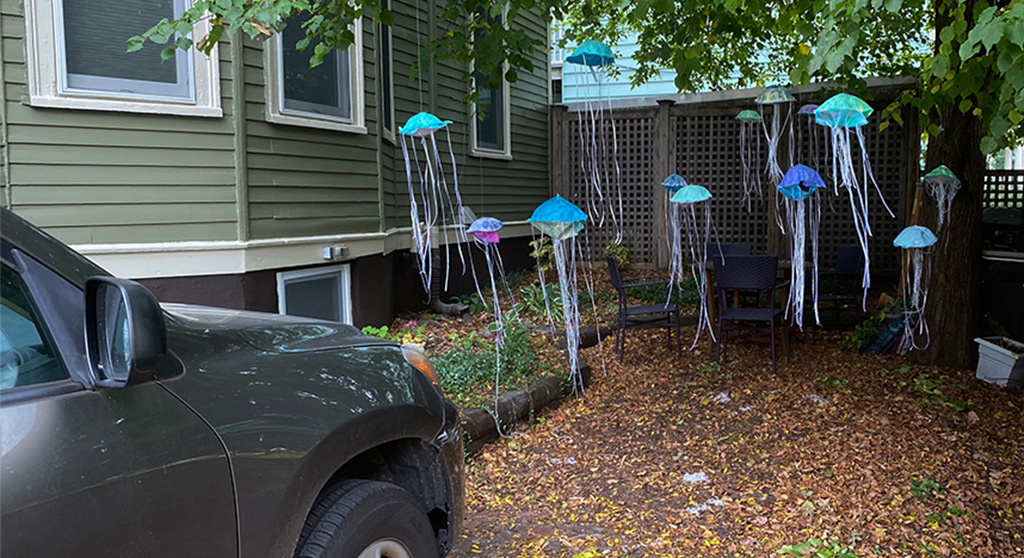Proposal to allow less or no off-street parking moves to committee for a look at ramifications

Part of a driveway space at a home on Traymore Street in the Baldwin neighborhood has become a whimsical outdoor leisure area in November. (Photo: Marc Levy)
A plan to remove parking minimums across Cambridge – and have city staff determine commercial parking maximums – needs a deeper look at its effects before action is taken, city councillors decided Monday.
The councillor who proposed the plan Feb. 7, Burhan Azeem, will now hold talks in his own Transportation & Public Utilities Committee before it can make its way back for a vote; he’d hoped to get staff examining zoning law and providing language that would allow property owners and developers to eliminate off-street spaces for cars. One-third of Cambridge households don’t need the parking and could do something else with the square footage, and without a requirement for parking spaces, the city could see more housing, Azeem said.
The approach wouldn’t stop developers from creating parking if they see a demand, backers said, but could avoid the expense of seeking a special permit or variance to adjust the amount of parking project by project.
Change was slowed by councillor E. Denise Simmons out of concern for “unintended consequences.” After stopping debate three weeks ago through use of her “charter right,” she used the time to convince Azeem that more exploration of the plan’s pros and the cons was needed.
“I know that this would be a significant change, and I think it’s important that we do this properly and go through the process,” Azeem said Monday. “I’m hoping that this will be a positive change that the whole City Council can support.”
Echoed in bike lane debate
Supporters among residents such as as Aaron Homer saw the idea as beneficial “in a future with hopefully fewer cars and more public transit and other options.”
There were also voices against the change. More than half of residents who work do it outside of Cambridge, but “we have no city or regional transport, and the number who must drive and park cars vary significantly from one area to another, as does their income level,” said Suzanne Blier of the Cambridge Citizens Coalition. “Ending parking minimums is more about ideology than practice. Let’s be practical.”
In addition to Azeem’s call to have less off-street parking in a Cambridge with fewer cars, more bicycles and – the hope is – more public transportation, the nearly six-hour council meeting including some of an ongoing debate about bike lanes. Their installation along business corridors is reducing on-street parking, which some say will kill businesses.
Azeem’s plan was presented in a pair of policy orders – one removing references to minimums from zoning and another substituting language to the effect that “the city should not require, but still allow, homes to have off-street parking spaces.” The language was also meant to gauge interest among councillors about parking maximums, he said.




for those who don’t need their spaces, can’t they rent then or use them how they want anyway? I know many a gardener with an array of flower pots, chairs, picnic table. Some removed asphalt for permeable gravel. without some minimum parking (in some projects slated as .4 spaces), developers will take advantage and fill the whole zoning criteria so there won’t be any recourse to create a space down the road. A car space is small and for those people who work outside of Cambridge, have healthcare workers visit, deliveries at their door, even in a snow storm a space is a godsend. It is unrealistic to have 80 yr olds spend money on uber to go to a medical appointment, or a young mother with children transporting groceries, etc. While some people are now more aware, it still doesn’t mean they can do 5 errands and visit family out of the city. Now with meters on the streets taking 10 spaces at a time, you want to cut our off-street too? Ideology vs practicality indeed.
these proposals will not only kill restaurants and small businesses, but when parking spaces on side streets start to disappear, residents will no longer be able to have visitors. These proposals are out of control. Thank you Denise Simmons for being the voice of reason.